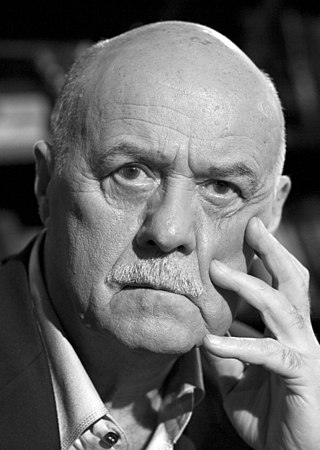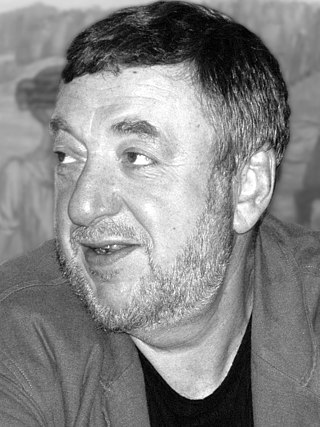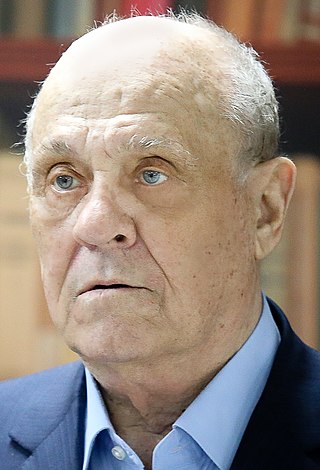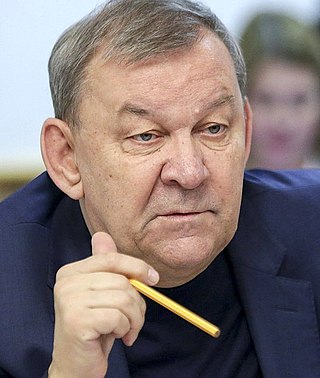
In the Russian Federation, a city of federal importance, also known as a federal city, is a city that has a status of both an inhabited locality and a constituent federal subject. Russia has two federal cities: Moscow and Saint Petersburg. Sevastopol, which was annexed in 2014, is claimed as Russia's third federal city, but remains internationally recognised as part of Ukraine.

Oleg Pavlovich Tabakov was a Soviet and Russian actor and the Artistic Director of the Moscow Art Theatre. People's Artist of the USSR (1988).

Mikhail Sergeyevich Boyarsky is a Russian actor and singer. He is best known for playing swashbucklers in historical adventure films; the role of d'Artagnan in the 1978 Soviet adaptation of Alexander Dumas' Three Musketeers elevated Boyarsky to the nationwide fame.

Stanislav Sergeyevich Govorukhin was a Soviet and Russian film director, actor, screenwriter, producer and politician. He was named People's Artist of Russia in 2006. His movies often featured detective or adventure plots.

Nikolay Vyacheslavovich Rastorguyev is the lead singer of the Russian group Lyube.

Pavel Semyonovich Lungin is a Russian film director. He is sometimes credited as Pavel Loungine. Lungin was awarded the distinction People's Artist of Russia in 2008.

Vladimir Rudolfovich Solovyov is a Russian TV presenter and propagandist. He has been an anchor on the television show Evening with Vladimir Solovyov on Russia-1 since 2012.

Vladimir Valentinovich Menshov was a Soviet and Russian actor and film director. He was noted for depicting the Russian everyman and working class life in his films. Although Menshov mostly worked as an actor, he is better known for the films he directed, especially for the 1979 melodrama Moscow Does Not Believe in Tears, which won the Academy Award for Best Foreign Language Film. Actress Vera Alentova, who starred in the film, is the mother of Vladimir Menshov's daughter Yuliya Menshova.

The Crimean Bridge, also called Kerch Strait Bridge or Kerch Bridge, is a pair of parallel bridges, one for a four-lane road and one for a double-track railway, spanning the Kerch Strait between the Taman Peninsula of Krasnodar Krai in Russia and the Kerch Peninsula of Crimea. Built by the Russian Federation after its annexation of Crimea at the start of 2014, the bridge cost ₽227.92 billion (US$3.7 billion) and has a length of 19 km (12 mi), making it the longest bridge in Europe and the longest bridge ever constructed by Russia.

Vladimir Georgievich Urin is a People's Artists of Russia; a Musical Theatre of Stanislavsky and Nemirovich-Danchenko director (1995–2013), then Bolshoi Theatre director until 1 December 2023.

The Partition Treaty on the Status and Conditions of the Black Sea Fleet consists of three bilateral agreements between Russia and Ukraine signed on 28 May 1997 whereby the two countries established two independent national fleets, divided armaments and bases between them, and set forth conditions for basing of the Russian Black Sea Fleet in Crimea. The treaty was supplemented by provisions in the Russian–Ukrainian Friendship Treaty, which was signed three days later. Russia unilaterally terminated the Partition Treaty in 2014 after it annexed Crimea.

The 2014 anti-war protests in Russia refers to a series of anti-war demonstrations opposing the Russian military intervention in Ukraine that took place in Russia in 2014. Protesters held two anti-war protest rallies on 2 and 15 March 2014. The latter, known as the March of Peace, took place in Moscow a day before the Crimean referendum. The protests have been the largest in Russia since the 2011–2013 Russian protests by the Russian opposition against the alleged electoral fraud committed by United Russia during the 2011 Russian legislative election. Reuters reported that around 20,000 people participated in the 15 March demonstrations.

In February and March 2014, Russia invaded the Crimean Peninsula, part of Ukraine, and then annexed it. This took place in the relative power vacuum immediately following the Revolution of Dignity. It marked the beginning of the Russo-Ukrainian War.

On 18 March 2014, Russian president Vladimir Putin gave a speech to both chambers of the Federal Assembly of the Russian Federation in connection with the request for admission by the Crimean parliament of the republic in the Russian Federation. He spoke in the St. George Hall of the Grand Kremlin Palace in the Moscow Kremlin.
Russian intelligentsia expressed various reactions to the Russian annexation of Crimea.

American Daughter is a Russian road comedy-drama film directed by Karen Shakhnazarov.

Yelena Yurievna Gagarina is a Russian art historian. She is the general director of Moscow Kremlin Museums since 2001. She is also the elder daughter of Yuri Gagarin.

In March and April 2021, prior to the 2022 Russian invasion of Ukraine, the Russian Armed Forces began massing thousands of personnel and military equipment near Russia's border with Ukraine and in Crimea, representing the largest mobilisation since the illegal annexation of Crimea in 2014. This precipitated an international crisis due to concerns over a potential invasion. Satellite imagery showed movements of armour, missiles, and heavy weaponry towards the border. The troops were partially withdrawn by June 2021, though the infrastructure was left in place. A second build-up began in October 2021, this time with more soldiers and with deployments on new fronts; by December over 100,000 Russian troops were massed around Ukraine on three sides, including Belarus from the north and Crimea from the south. Despite the Russian military build-ups, Russian officials from November 2021 to 20 February 2022 repeatedly denied that Russia had plans to invade Ukraine.
On 4 March 2022, the Russian Union of Rectors signed an address in support of the 2022 Russian invasion of Ukraine. The letter was signed by heads (rectors) of 304 higher education institutions in Russia. It was highly publicized inside Russia, but internationally it only led to further isolation of Russian educational institutions.
Khitrovka. The Sign of Four is a 2023 Russian mystery film directed by Karen Shakhnazarov about the theatrical bohemians of the early 20th century and the inhabitants of the Khitrovka slums. It stars Konstantin Kryukov, Mikhail Porechenkov and Alexander Oleshko. The film is based on the works of Vladimir Gilyarovsky and Arthur Conan Doyle's novel The Sign of Four.


















